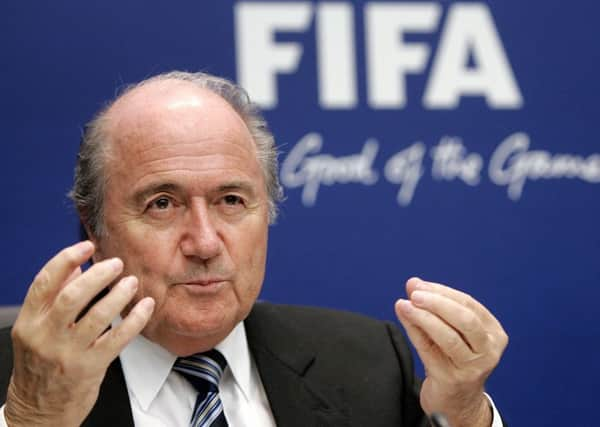Leaders: Fifa scandal tarnishes the beautiful game


Football’s world governing body has been dogged by such allegations for so long that when news broke yesterday that seven officials had been detained in Zurich and a further seven indicted, the first reaction was: “Does that include Blatter?”
The long-serving Fifa president, now aged 79, is not among those who were named by United States investigators yesterday, although Swiss prosecutors have said he could be questioned in the coming weeks. Sepp Blatter is a formidable politician and the ultimate survivor, but he will not have slept soundly last night.
Advertisement
Hide AdAdvertisement
Hide AdAllegations about Fifa corruption have been around for many years without ever being fully established. They peaked after the 2018 and 2022 World Cups were awarded to Russia, and extraordinarily, Qatar – a state with no football pedigree, and summer temperatures so dangerously high (around 50C) that the 2022 World Cup final has been scheduled for a week before Christmas. The decision to go to Qatar made no sense. What could possibly have encouraged Fifa delegates to vote for this ridiculous option?
It also emerged yesterday that the awarding of the 2010 World Cup to South Africa is under investigation over bribery.
Many will find it ironic that it is the FBI, along with its Swiss counterparts, that has finally taken the bull by the horns over corruption allegations in a global sport which is far stronger, and matters more, in other parts of the world than the US. Some of these corruption allegations pertain to the FBI’s immediate jurisdiction. But the truth is that it required an organisation with the strength and resource of the FBI to have any chance of succeeding.
True to form, Fifa insisted that tomorrow’s presidential election goes ahead as planned – Blatter is on course to be elected for a fifth term – and there will be no change to the World Cup venues for 2018 and 2022.
Last night, European football’s governing body, Uefa, added its voice to calls for the presidential election to be postponed. This is the only option for Fifa if it hopes to survive this scandal.
If corruption at such a level is established, Blatter’s defence will be to claim he did not know. Even if he was to be believed, implausible though that might seem, it would only prove he is not fit for office.
Preparations for the 2018 and 2022 World Cups should also be put on hold until full investigations have been completed. It would be difficult, but not impossible, to reallocate the 2018 finals. But here is no reason why the 2022 decision cannot be reversed if necessary.
Yesterday’s developments signal what must be the beginning of the end of the Blatter era. For many in what was the beautiful game, this is long overdue.
Back to business as usual
Advertisement
Hide AdAdvertisement
Hide AdNORMAL service has been resumed. After the Prime Minister said he would consider giving more powers to Scotland following post-election talks with the First Minister, the mood was not quite so conciliatory yesterday when David Cameron addressed the SNP’s 50-plus MPs across the Commons. “Put up or shut up” was the thrust of it when hostilities resumed over Scotland’s future.
Mr Cameron challenged the Scottish Government to make full use of available powers before asking for more, and took aim at what he believes is the SNP’s weakest point: full fiscal autonomy. One theory is that granting this power would effectively give the SNP enough rope to hang itself, but Mr Cameron does not appear ready to take that course of action. Instead, he has put the responsibility on the Nationalists to spell out a case for autonomy which he believes is impossible to make.
It is up to Nicola Sturgeon and her colleagues to come up with proposals which make Mr Cameron regret that he asked the question. But the early indications are that a full answer will not be forthcoming any time soon. The First Minister appeared to backtrack on full fiscal autonomy after the general election, stating that it would take “years” to implement.
Wringing concessions out of a majority government is going to be a tall order for the SNP, and may ultimately prove to be impossible. But the Nationalists do have a responsibility and a requirement to set out a compelling case for whatever powers they feel are needed – without involving an extra £10 billion of cuts or tax rises.